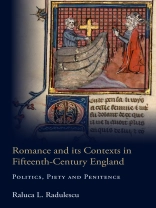Examination of romance texts from late medieval England, linking them firmly to their political and social context.
Although the anonymous pious Middle English romances and Sir Thomas Malory’s
Morte Darthur have rarely been studied in relation to each other, they in fact share at least two thematic concerns, vocabularies of suffering andgenealogical concerns, as this book demonstrates. By examining a broad cultural and political framework stretching from Richard II’s deposition to the end of the Wars of the Roses through the prism of piety, politics and penitence, the author draws attention to the specific circumstances in which
Sir Isumbras, Sir Gowther, Roberd of Cisely, Henry Lovelich’s
History of the Holy Grail and Malory’s
Morte were read in fifteenth-century England. In the case of the pious romances this implies a study of their reception long after their original composition or translation centuries earlier; in Lovelich’s case, an examination of metropolitan culture leads to an opening of the discussion to French romance models as well as English chronicle writing. Overall romance reception is investigated through analysis of the manuscript transmission and circulation of these texts alongside contemporary devotional and political texts and chronicles.
Dr Raluca Radulescu is Reader in Medieval Literature and Co-Director, Institute for Medieval & Early Modern Studies, Bangor and Aberystwyth Universities.
Jadual kandungan
Preface
Fifteenth-century Contexts for the Reading of Middle English Romances
Spiritual Journeys through Political Realities: the ‘Pious’ Romances
Chronicling Britain’s Christian Conversion: Henry Lovelich’s
History of the Holy Grail
The Politics of Salvation in Thomas Malory’s
Le Morte Darthur
Afterword
Appendices
Bibliography
Mengenai Pengarang
Dr Raluca Radulescu is Senior Lecturer in Medieval Literature, Bangor University












